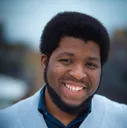Stay in the Loop
BSR publishes on a weekly schedule, with an email newsletter every Wednesday and Thursday morning. There’s no paywall, and subscribing is always free.
Songs for hope in Black America
Opera Philadelphia presents ‘Cycles of My Being’

A chorus of protestors chanting “Black Lives Matter” crescendos as the opening of Opera Philadelphia’s streamed production of Cycles of My Being reveals a clarinet, violin, cello, piano, and podiums. The camera cuts to a wide shot, revealing the entire set, with light cast from above amid stark shadows. The players enter the room, one by one, in solemn quietude. Then, when everyone has their place, the stage waits. Breathe in. A Black Lives Matter sticker on the podium accompanies stenciled images of Emmett Till and George Floyd. Cut to black. The first cycle, “Inhale, Exhale,” trickles in.
Prepare for a haunting musical journey.
“Do you care for me?”
Cycles of My Being is a song cycle composed by Tyshawn Sorey, a Newark-born multi-instrumentalist with international credentials. It features lyrics by Terrance Hayes (from his book American Sonnets for My Past and Future Assassin), and performances by lyricist and tenor Lawrence Brownlee, violinist Randall Mitsuo Goosby, cellist Khari Joyner, clarinetist Alexander Laing, and pianist Myra Huang. Originally debuting in 2018, Sorey’s Cycles is a gripping, timely opera, brooding on the hinges of both pain and hope.
The first cycle poses the question to America, on behalf of its Black men, “Do you care for me, as I care for you? Do you love the air in me as I love the air in you?” Delivered with immense heart and vigor, Brownlee’s voice vibrates with a steady swagger. He packs an unrelenting emotional punch. There are few breaks for him. The second cycle has him rolling high and he hardly ever lets up. It’s exasperating. It’s exhausting. It’s suffocating. Just like being Black in America. But he’s not on the attack in any traditional sense: “When angry, hope is a blade. When wounded, hope is what heals me,” he belts in the cycle. Cycles of My Being is a devastated pursuit of hope, empowerment, and liberation.
Hearing and seeing my being
Sonically, the hope exudes dissonant, chaotic, and rapid sweeps. The music is running both from and toward something. The piano leans on rumbling, dark chords with sparse but commanding strokes. The clarinet introduces incongruent breaths that are like breezes of levity in an otherwise arresting sound. The strings avalanche into cohesive waves, pulling the dissonance and chaos together by the end of each cycle like the moon over the tides. This is what “my being” sounds like in my synesthesiac head. This is what it sounds like for all Black Americans.
Simply put: it’s painstakingly beautiful.
Cellist Joyner and violinist Goosby wear black hoodies with the hoods up throughout the performance. The image alone feels like a rebellion—or reclaiming—of the style that has come with stigmas. Black men wearing black hoodies with their hoods up is often associated with violence and with criminality. It was partly what got Trayvon Martin killed. For me, and for many Black people, a hoodie is a means of comfort and escape—an introverted way of keeping to and protecting oneself. Seeing this in an opera is striking and refreshing. Seeing Black people in an opera alone is refreshing, and is something that needs more visibility.

Watch and breathe
I don’t know how to speak about opera because I never participated in it. I don’t have any reference points. I had nothing against it, but before Opera Philadelphia’s 2017 We Shall Not Be Moved hit me close to home (literally), opera hadn’t yet spoken to me. With Cycles of My Being, the second opera I’ve experienced, it speaks again. The show delivers a direct message through its minimalist design. It’s on the nose, which it should be. No matter how you coat it, when people speak about the Black experience, it usually goes unnoticed. Sorey doesn’t play nice, and he doesn’t dance around the questions Black people have that never get answered by America.
Cycles of My Being is chilling and unnerving. Sorey’s composition carries hopeful strength decorated by anguish and disenchantment. This evocative inquisition will stick with you. Watch it with the lights off. Turn it all the way up. Hide your phone in the other room. Absorb the music. Take in the lingering cinematography that accents the story. Breathe when it’s over, take a day away from it, and watch it again. Cycles of My Being will vibrate through you for a long time.
Image description: A photo of a performance of Cycles of My Being. The violinist and cellist are to the left, the pianist in the center, and the clarinetist on the right, with the tenor also to the right but more to the front of the other players. The set is dim with lights cast on each performer from above.
Image description: A photo of tenor Lawrence Brownlee, a 48-year-old Black man, singing at a podium. He wears a dark blue shirt. He’s on a dark stage, illuminated from above.
What, When, Where
Cycles of My Being. Directed by Leslie Rivera. Composed by Tyshawn Sorey; lyrics by Terrance Hayes and Lawrence Brownlee. Available for streaming on demand or via subscription via the Opera Philadelphia Channel through May 31, 2021. www.operaphila.tv.
Opera Philadelphia Channel offers closed captioning.
Sign up for our newsletter
All of the week's new articles, all in one place. Sign up for the free weekly BSR newsletters, and don't miss a conversation.

 Kyle V. Hiller
Kyle V. Hiller